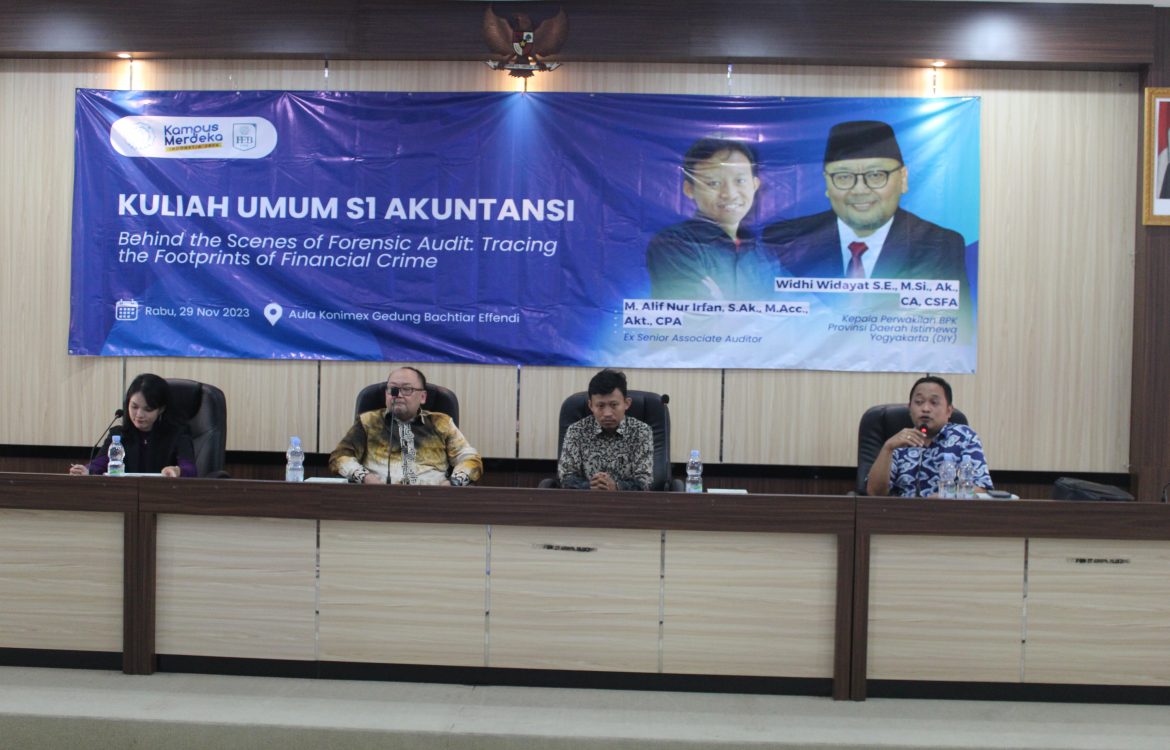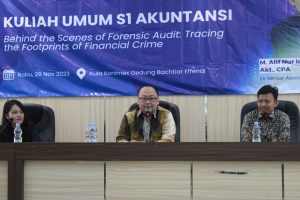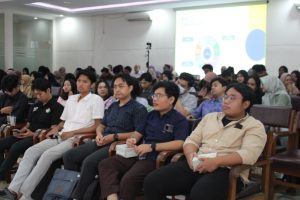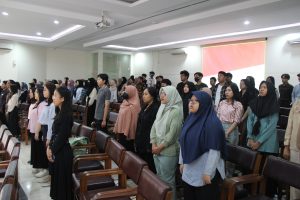
Accounting Study Program Presents Public Lecture – Behind the Scenes of Forensic Audit: Tracing the Footprints of Financial Crime Investigative Audit
Essentially, financial crimes occur because of a gap between the interests of investors and the management’s interest within an entity or state financial manager. The gap between investors’ expectations and an entity’s management actions increases mistrust, because there may be misaligned interests. Investors want their investments to be profitable. Meanwhile, management feels the need to look for personal prosperity, but on the other hand, they also need to meet investor expectations.
 That gap must be aligned by a process called audit. The audit process shall be conducted by an independent party acting professionally in accordance with the code of ethics and standards.
That gap must be aligned by a process called audit. The audit process shall be conducted by an independent party acting professionally in accordance with the code of ethics and standards.
This statement was conveyed by Widhi Widayat, S.E., M.Si., Ak., CA., CSFA., Representative of the Head of BPK Yogyakarta Special Region, opening his presentation at the Public Lecture “Behind the Scenes of Forensic Audit: Tracing the Footprints of Financial Crime,” Wednesday, November 29, 2023 at Konimex Hall, Bachtiar Effendi Building, Faculty of Economics and Business (FEB), Universitas Sebelas Maret (UNS).
He further explained that fraud can be defined as misstatement or intentional omission of amounts or disclosures in financial statements to deceive users of financial statements.
It turns out that fraud keeps growing along with technological developments, the development of the entity’s business as well, and especially technology that is increasingly open to opportunities to make fraud grow.
 This also encourages the development of the theory on how to identify when a fraud occurred. “The motive of fraud keeps growing, initially due to pressure, also because of capability or ability, this is mainly because usually fraud is carried out by people who have great authority in an entity. As the theory grew, a new causative factor called arrogance emerged. The arrogance of someone with a very high position, who feels untouchable or not bound by the rules, as well as the feeling of legal immunity, thus, they feel free to commit fraud,” he said.
This also encourages the development of the theory on how to identify when a fraud occurred. “The motive of fraud keeps growing, initially due to pressure, also because of capability or ability, this is mainly because usually fraud is carried out by people who have great authority in an entity. As the theory grew, a new causative factor called arrogance emerged. The arrogance of someone with a very high position, who feels untouchable or not bound by the rules, as well as the feeling of legal immunity, thus, they feel free to commit fraud,” he said.
Through the material presentation, he also explained that fraud is not possible to be done by only one or two people, thus, it must be carried out in collaboration both by internal and external parties.
According to Regulation No. 30/1999 in conjunction with Law No. 20/2001 on Corruption, there are 7 types of corruption, namely state financial losses, bribery, embezzlement in office position, extortion, fraudulent acts, conflicts of interest, and gratification.
In the next discussion, Widhi, who is a graduate of the FEB UNS Accounting Study Program, mentioned five characteristics of an investigative examination. First, the examination technique carried out is very in-depth, it must reveal the facts of the fraud that are hidden; second, the reverse proof must be carried out to prove whether the fraud actually occurred or did not occur; third, it is carried out in a manner that is in accordance with the legal provisions and human rights; fourth, the adequacy and accuracy of the evidence exceeds the non-investigative examination; and fifth, it presents the facts and process of the incident, proving it in court.
 The series of investigative examinations includes pre-planning, planning, implementation, and reporting.
The series of investigative examinations includes pre-planning, planning, implementation, and reporting.
Closing his presentation, Widhi advised the students that the accounting profession is to provide adequate confidence to the parties concerned, so from now on get used to being a credible person in everyone’s eyes, competent in the eyes of anyone, and independent in anyone’s eyes.
The second speaker, another graduate of the FEB UNS Accounting Study Program, M. Alif Nur Irfan, Ex-Senior Associate Auditor, explains in more detail the difference between forensic audit and conventional audit.
The public lecture hosted by the Accounting Undergraduate Study Program and opened by Prof. Agung Nur Probohudono, S.E., M.Si., Ph.D., Ak., CA., CFrA., Head of S1 Accounting Study Program, was attended by more than 100 students. The discussion session provided opportunities for participants to submit questions to the two speakers.

